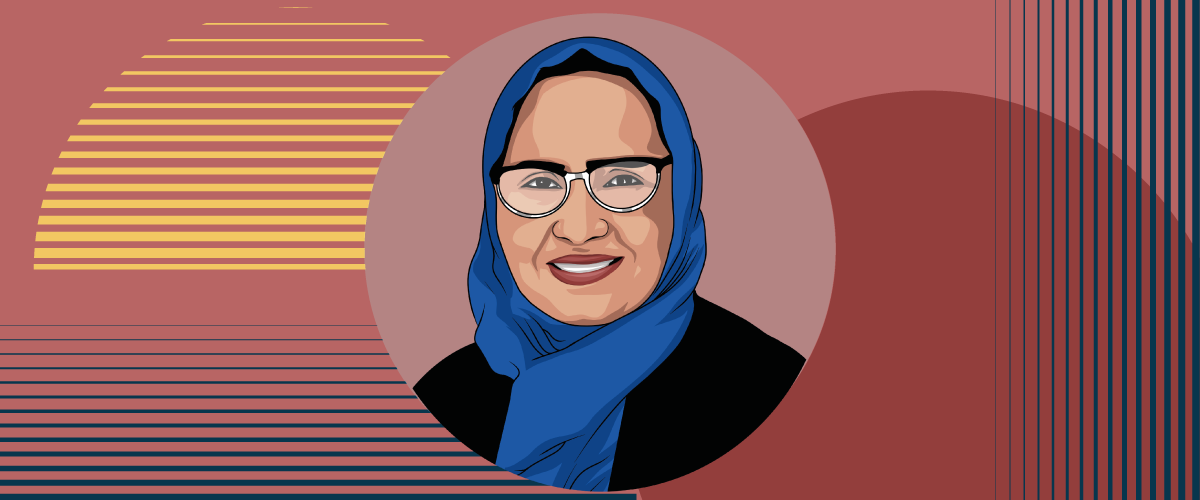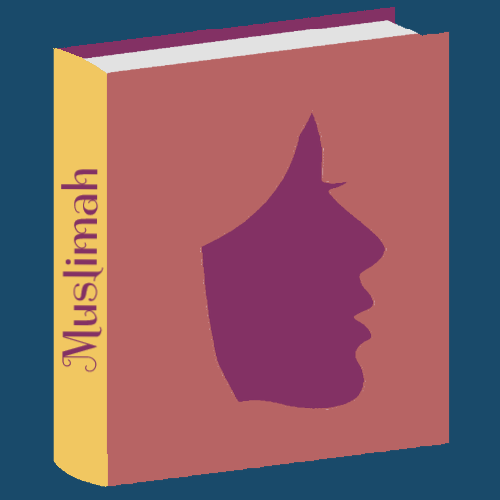
Nevertheless, She Persisted — Ghazala Fauzia
—by Seemab ZahraWhile standing in front of the check-in counter at Peshawar Airport, along with her children and a huge amount of luggage, Ghazala Fauzia was waiting for the final decision that would change her life forever: would she be going to Canada or staying in Pakistan? Her fate was being determined, and there were only a few hours left until her application would be cancelled if she had not entered Canada. She had travelled all alone from Jhang, a city in Punjab, to Peshawar, which was in another province.
Ghazala was married in 1988. As a new couple dreaming of their future together, she and her husband often discussed settling in North America where her husband felt they were destined to live, but Ghazala was not convinced. Time went by, and Ghazala and her husband were given their first opportunity to experience living and working outside of Pakistan when her husband was offered a contract job in Nepal in 1998.
While they were in Nepal, family friends told them about their plans to move to Canada and suggested to Ghazala and her husband that they should also consider it. These conversations, the experience of living in a new country with a different language and culture, and meeting a diverse group of people eventually convinced Ghazala to consider immigration as a way forward for her family.
Ghazala and her husband started their application process in 2000, but soon they encountered the first hurdle in their immigration application process, as 9/11 delayed everything, including Canada’s immigration procedures. It was their first obstacle, but definitely not the last. While their application was still being processed, Ghazala and her family had to move back to Pakistan as her husband’s contract in Nepal ended. Little did they know that there would be more challenges awaiting them. As a public service employee, Ghazala’s husband was not granted permission to leave the country, which made him decide to quit his job.
After five arduous years of waiting, and with only three days left before his visa’s expiration date, Ghazala’s husband was finally handed his immigration papers in Bangkok. He flew from Bangkok shortly after receiving the visas to secure their official entry to Canada. By the time Ghazala finally received her papers in Pakistan, she had only 24 hours to land in Canada, on her own with four children as well as their luggage in the tow.
It was summer in Pakistan. The scorching heat was enough to set anything ablaze and Ghazala had to get herself and her children — the youngest being seven — as well as all their luggage from Jhang to Islamabad, and then take an 11-hour road trip to Peshawar. This physical and emotional ordeal almost had her giving up on moving to Canada.
As if things could not get any worse, after a long wait at the airport, Ghazala was informed that she could not fly at all. It turned out the flight that would have taken her to Canada had multiple layovers and was scheduled in a way that even if they did travel, they would not reach Canada until past midnight. This meant that she could be denied entry, potentially having to travel back to Pakistan right away.
Tired and frustrated, Ghazala travelled back to Jhang that day and started settling herself in her hometown with the help of her family, while her husband started the paperwork in Canada to have the immigration visas for Ghazala and their children reissued. Ghazala loved living close to her family as she waited for her immigration papers to arrive.
A year later, Ghazala finally got the news that their application for permanent residence in Canada was approved. As she was preparing to move to Canada in the summer of 2006, her eldest son decided to stay in Pakistan to complete medical school, which he had started while they were waiting for their immigration papers. Ghazala was heartbroken again, as her family would not be moving together — they would be separated for another six years until her son joined them in 2012.
From the moment Ghazala decided to move to Canada, she knew that there would be challenges, and she was prepared to face them all. Within the first month of arriving, she took a job at a company in Waterloo, where she worked in assembly and production. But that was just the start.
Ghazala had grown up observing her parents doing community work. A professor of English language, Ghazala’s father was keen that women should have access to education. After his retirement, he spent the rest of his life volunteering to teach English at a religious school for girls. Ghazala’s mother had always taken the time to teach the Quran to girls from the neighbourhood. Her parents raised nine children while also taking care of hundreds of people in their community. Seldom were they alone as a family, as their house always echoed with the sounds of relatives and children visiting from their village. There was always food and a place to sleep comfortably for everyone in her parental home. Ghazala remembers fondly how her parents made sure that everyone in the family, as well as all of their visitors were looked after, fed, and taken care of.
Inspired by her parents, Ghazala has always been engaged in serving others. While in Pakistan, she founded a women's group in her hometown, engaged women with access to resources in helping those in need. This group founded by Ghazala continues today. In 2002, while living in Islamabad, the capital of Pakistan, Ghazala joined Women’s Aid Trust as a service coordinator. In this role, she worked with female inmates and their children. The purpose of this project was to help inmates by providing them with education and skills, development training to make them feel productive while still serving their sentence. Going above and beyond, Ghazala connected the women with lawyers to help in matters such as bail, brought teachers in to teach their children, collected funds for their bail, arranged for better food and medications, and facilitated doctors’ visits for their regular checkups.
Ghazala had planned to continue her community service work in Canada. In her first year in Canada, she visited Wilfrid Laurier University (WLU) in Kitchener to enquire about pursuing a master’s degree in social work. She was disappointed to learn that the process would be much lengthier than what she had expected, as with everything she’d encountered thus far, so she decided to take her time and move through it one step at a time.
A family friend in Kitchener soon connected Ghazala with an employment councillor at The Working Centre. This turned out to be the perfect match. With the guidance and support of her newly found acquaintance, Ghazala confidently began to turn things around for herself. She started taking evening classes at Conestoga College as well as volunteering to gain Canadian experience while still doing continental shift work and raising her family.
Ghazala’s hard work started to pay off. In 2008 she was hired by The Working Centre for a project called Social Work Bridging Program. This was a collaborative project between The Working Centre and WLU designed for newcomers who wished to pursue a career in social work in Canada. Through this program, Ghazala made some connections with WLU at the organizational level and this exposure encouraged her to once again approach the university to discuss the possibility of getting enrolled in the master’s program. Upon reviewing her updated resume and qualifications in 2009, she was officially admitted.
In the spring of 2010, Ghazala attended a community meeting along with a number of other Muslim women to discuss what could be done in Kitchener-Waterloo to address Bill 94. This initial meeting gave birth to a grassroots initiative — Coalition of Concerned Muslim Women of KW. Ghazala became extremely involved with this initiative from day one and played a leading role as this organization moved forward. This committed group of citizens organized a public forum called “Let us Talk,” to enlighten the public about how the proposed bill would affect the lives of Canadian Muslim women.
Over 150 community members attended the event. Attendees were very interested in the issue and asked a lot of questions. The organizers and panellists took all the questions with an open heart and answered each of them. It was a very successful event that garnered a lot of media attention. For most of the organizers, it was the first time they had established contact with the media. The success of this event paved the way to establishing the Coalition of Muslim Women of Kitchener-Waterloo (CMW).
A founding member of the CMW, Ghazala has never rested since the inception of the organization. From leading CMW’s first strategic planning process to steering the ship skilfully as the chair of the board when the organization was going through its most significant transformation, from setting up and taking down events, to designing and conducting internal and external event and program evaluations, from facilitating candid discussions among members and volunteers to providing training on mental health and well-being, from cleaning to child-minding to printing and photocopying, Ghazala’s footprints are everywhere in the Coalition. She is a pillar that provides strength and support for the CMW. To show their appreciation for her unparalleled passion, loyalty, and love for the CMW, she was awarded with a 10-year service award in 2020.
Ghazala had always wished to meet good people. She believes that having good people around makes everything easier. She added, “And that is why I love the Coalition because we have such talented and passionate women who make me feel that I am not alone and share my passion for supporting women.”
Ghazala believes that women can perform beyond the predefined roles of mother, sister, wife, and daughter. Although these roles are very important for her, she believes that every woman is gifted with unique skills and must utilize them and imagine themself beyond these traditional relationship roles. Ghazala has always taken a keen interest in her health and well-being. She enjoys swimming and her regular gym visits. She has recently learned to ride a bicycle and now proudly bikes around for leisure. The next item on her to-learn list is skiing. She loves to play board games with her children, who are also busy professionals like her, and yet they all manage to find time for these fun moments together.
Ghazala’s journey would not have been possible without the support she received from her husband. He has stood by her — from her educational goals to her community work.
Ghazala is an inspiration for everyone who wishes to bring change in society by uplifting others. When she left Pakistan, she not only packed things that she would need to survive in Canada, but she also packed a great deal of compassion, love, and care for the community she was going to join. She also brought a heart of gold. She continually searched for likeminded women who shared her passion to improve and enrich the community, and together they have brought waves of positive change to their communities.
Ghazala’s story is of perseverance and persistence. In Ghazala’s own words, “If we are persistent and we don’t lose hope, things eventually work out. Yes, sometimes it takes more time and that’s okay. But if we know what we want, and we have a plan, and we keep working towards our goals, things will start to happen.
